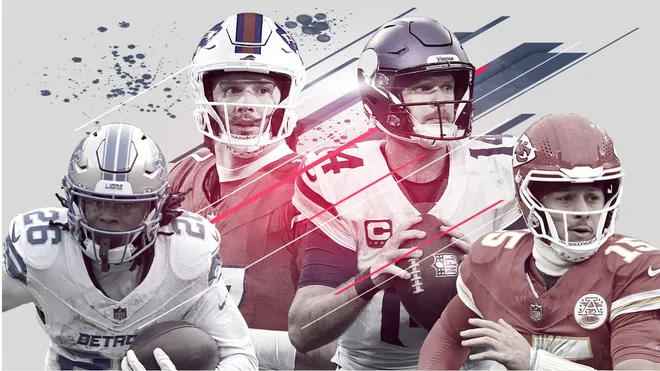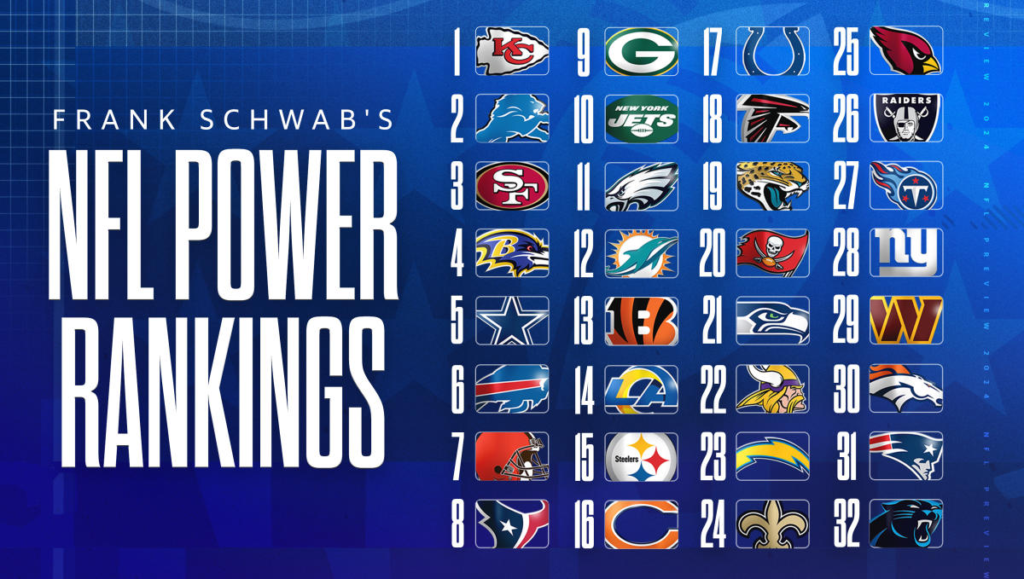NFL Power Rankings: Your Ultimate Guide to Understanding the Game’s Hierarchy

Football fans live for the thrill, the drama, and the ever-changing dynamics of the NFL. The NFL power rankings are more than just a list; they’re a comprehensive snapshot of how teams stack up against one another during the season. These rankings provide insights into team performance, player contributions, and coaching strategies. Whether you’re a die-hard fan or a casual observer, the NFL power rankings serve as your weekly guide to the league’s best and worst.
The NFL power rankings are an ever-evolving system that ranks all 32 teams based on performance, potential, and overall capability. Unlike the standings, which are strictly based on wins and losses, power rankings consider a variety of elements, including strength of schedule, player injuries, and overall team momentum.
Football enthusiasts eagerly await these rankings each week to see where their favorite teams stand. Are the Kansas City Chiefs still dominating? Did the Dallas Cowboys rise after a stellar performance? Such questions make power rankings a focal point of every NFL discussion.
The beauty of NFL power rankings lies in their subjectivity. Analysts, fans, and pundits all have differing opinions, which leads to heated debates and endless speculation. For those looking to understand football on a deeper level, diving into these rankings is a must.
- Why NFL Power Rankings Matter
NFL power rankings aren’t just a fun topic for debate; they serve a much larger purpose in the world of football. For fans, they provide context. Are their teams overperforming or underachieving? For teams, rankings can act as motivation or a wake-up call.
Fuel for Fans

Fans are the heart of football, and the NFL power rankings keep them engaged. Rankings validate their loyalty or spark frustration. A fan of a team ranked too low might cry foul, while fans of top-ranked teams relish the validation.
Insight for Analysts
Power rankings offer a platform for analysts to showcase their understanding of the game. Breaking down why one team ranks above another requires a blend of data interpretation and football intuition.
Motivation for Teams
NFL power rankings can also play a role in locker-room dynamics. Teams often use their rankings as bulletin board material, rallying around perceived disrespect or riding the wave of a high ranking into their next matchup.
- How NFL Power Rankings Are Determined
While NFL power rankings vary depending on who’s creating them, most follow a similar formula. Analysts look at a combination of stats, trends, and intangibles.
Win-Loss Record
This is the foundation. Teams with more wins naturally rank higher, but a perfect record doesn’t guarantee the top spot. The strength of competition and the quality of victories matter.
Strength of Schedule
A team beating top-tier opponents weighs more heavily than one cruising past struggling franchises. For example, if the Philadelphia Eagles defeat the San Francisco 49ers, it’s a bigger deal than beating a lower-tier team like the Arizona Cardinals.
Key Metrics
Yards gained, turnovers forced, and time of possession are just a few of the metrics that influence rankings. Advanced stats like Expected Points Added (EPA) and Pro Football Focus (PFF) grades add another layer of analysis.
- Factors Influencing NFL Power Rankings
Several factors, both on and off the field, shape the weekly NFL power rankings.
Injuries
A single injury can shift a team’s outlook dramatically. When a star quarterback like Patrick Mahomes is sidelined, the Kansas City Chiefs’ ranking might take a hit.
Momentum
Winning streaks build confidence, both on the field and in the rankings. Conversely, a string of losses can send a team plummeting.
Trades and Acquisitions
Midseason trades or free-agent signings can shift the balance of power. A star addition can elevate a team, while a blockbuster trade can weaken another.
- The Role of Analytics in NFL Power Rankings
Football analytics have transformed how we understand the game, and they play a pivotal role in shaping NFL power rankings.
Data-Driven Insights
Analytics provide a clearer picture of a team’s strengths and weaknesses. Metrics like DVOA (Defense-adjusted Value Over Average) give analysts a deeper understanding of team efficiency.
Player Performance
Using tools like PFF, analysts can rank individual player performances, which collectively impact the team’s ranking.
Predictive Models
Machine learning and predictive algorithms are increasingly being used to project future rankings based on historical and current data.
- Key Players Shaping NFL Power Rankings
Star players are often the deciding factor in a team’s rise or fall in the NFL power rankings.
Quarterbacks
From Tom Brady’s dominance to Lamar Jackson’s electrifying play, quarterbacks often have the most significant impact.
Defensive Stalwarts
Players like Aaron Donald and Micah Parsons show how the defense can win games—and push teams up the rankings.
Unsung Heroes
Special teams players and reliable backups also play pivotal roles. They don’t always get the spotlight, but their contributions can sway games.
- How Coaches Impact NFL Power Rankings
A team is only as good as its leadership, and coaching plays a massive role in NFL power rankings.
Strategic Masterminds

Coaches like Andy Reid and Bill Belichick are consistently praised for their ability to out-strategize opponents.
Adaptability
In-game adjustments and creative play-calling often distinguish good coaches from great ones.
Player Development
The best coaches know how to develop talent. This is crucial for teams looking to climb the rankings.
- Standout Performances in Recent NFL Power Rankings
Each week, standout performances cause seismic shifts in the NFL power rankings. A star quarterback’s five-touchdown game or a defense’s shutout performance can turn the tide.
Offensive Fireworks
High-scoring games often result in significant ranking boosts. Teams with explosive offenses are consistently rewarded.
Defensive Clinics
Shutting down a top-tier offense is one of the quickest ways to climb the rankings.
Clutch Wins
Winning close games against quality opponents is a hallmark of top-ranked teams.
- Weekly Variability in NFL Power Rankings
The NFL is a league of parity, and weekly rankings reflect this reality.
Surprise Upsets
Every week features at least one unexpected result, shaking up the rankings.
Consistency Matters
While some teams bounce around, the most consistent performers usually hold steady in the top spots.
- Historical Trends in NFL Power Rankings
Looking at the history of NFL power rankings reveals some fascinating trends.
Dynasties Dominate
Teams like the New England Patriots have enjoyed extended stays at the top due to sustained success.
The Underdog Story
Every season, an underdog team climbs the rankings, capturing fans’ hearts.
- Fan Reactions to NFL Power Rankings
Fans have strong opinions about NFL power rankings, which often spark debates on social media and sports talk shows.
Loyal Defenders
Fans of top-ranked teams celebrate the recognition and defend their placement fiercely.
Outrage and Debate
Lower-ranked teams’ fans often voice frustration, questioning the criteria used by analysts.
- Media’s Role in Shaping NFL Power Rankings
The media plays a crucial role in popularizing and critiquing NFL power rankings.
Narrative Building
Analysts often craft narratives around teams, influencing public perception.
Fan Engagement
Media outlets use rankings to drive discussions, keep fans engaged, and spark debates.
- Predicting the Future of NFL Power Rankings
As the NFL evolves, so too will its power rankings.
Advanced Metrics
Expect even greater reliance on analytics to shape rankings.
Interactive Fan Involvement
Some outlets might allow fans to vote or contribute to rankings in the future.
- Controversies Surrounding NFL Power Rankings
Power rankings aren’t without their controversies, often sparking heated debates among fans and analysts.
Bias Allegations
Accusations of favoritism or bias are common, particularly from fans of underrepresented teams.
Subjectivity vs. Objectivity
The balance between data-driven rankings and subjective opinions is always a point of contention.
- Conclusion: Why NFL Power Rankings Will Always Be Relevant
The NFL power rankings are an integral part of football culture, offering a dynamic way to follow the league. Whether you agree with them or not, they spark conversations, fuel rivalries, and deepen our understanding of the game.



